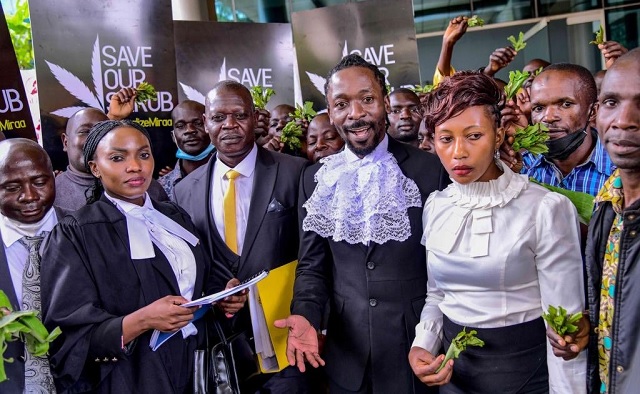
Kampala, Uganda | THE INDEPENDENT | The Constitutional Court in Kampala has nullified the entire Narcotic Drugs and Psychotropic Substances Control Act of 2016 on grounds that it was passed without the required quorum in Parliament.
Today morning, the five Justices comprising of the Deputy Chief Justice Richard Buteera, Stephen Musota who has since been elevated to the Supreme Court, Muzamiru Mutangula Kibeedi, Irene Mulyagonja and Monica Mugyenyi unanimously allowed a 2017 the petition filed by Wakiso Miraa Growers and Dealers Association Limited against the Attorney General .
The petitioners in 2017 through their lawyers led by Isaac Ssemakadde among other things challenged the Narcotic Drugs and Psychotropic Substances Control Act for prohibiting and criminalizing the cultivation, possession, consumption, sale , distribution, transportation and exportation of Catha edulis (khat) commonly known in Uganda as Miraa or Mairungi by classifying it as a prohibited plant.
The Parliament had put in place this law to ban several drugs including Cannabis , Bush Cocoa and specifically Mairungi on grounds that it is a psychoactive drug which contains cathinone and cathine, a substance known for several side effects such as increased blood pressure, a state of euphoria and elation with feelings of increased alertness and arousal.
As a result, the petitioners told Court that the prohibition was not backed up by any scientific evidence yet it had a disruptive effect on the livelihood, property, cultural and social economic rights of the petitioners who are Mairungi farmers, sellers and consumers .
The dependency on this once prohibited crop has further been explained by Vincent Kizito, a the Chairperson of Wakiso Miraa Growers and Dealers Association Limited who says that the crop should be treated as a delicacy as it is a source of their family incomes and their children’s school fees.
They argued and submitted before Court affidavit evidence from their Chairperson Kizito and their Legal Officer Isabella Nakiyonga to show that it was unconstitutional for Parliament to ban Mairungi.
As such, they asked the Constitutional Court to decategorize khat as a prohibited plant and Psychotropic Substance under the Narcotics Drugs Act in question.
📌📌BREAKING: The Constitutional Court has today nullified the whole of the Narcotic Drugs and Psychotropic Substances Act 2016. We have LEGALIZED IT, Jah Bless!❤ https://t.co/0mIBYxUMS4 pic.twitter.com/oVbLK4v5i1
— Isaac Ssemakadde (@IsaacSsemakadde) May 5, 2023
They further asked Court to issue an order permanently staying the implementation of the Narcotics Drugs Act and award them costs of the petition for the inconveniences caused to them.
On their part, the Attorney General through affidavits of State Attorney Brian Musota and the Deputy Clerk of Parliament Paul Wabwire asked Court to dismiss the case on grounds that the petition raised no issues or questions that require constitutional interpretation.
In their judgement, the Justices have been in agreement with Mairungi farmers that the process of passing the bill was flawed as the required number of MP was not attained on the November 19th, 2015 when the said Bill was passed and the Deputy Speaker by then did not take it upon himself to ascertain the existence of required quorum.
As such the Justices in the decision wrote by Justice Muzamiru Mutangula Kibeedi have ruled that the Parliament breached it’s own rules of procedure as the existence of quorum at the voting stage means the bill receives the majority or sufficient number of votes in order for it to be lawfully passed.
“From the review of the Hansards of 18th, 19th and 20th, 2014, it is my finding that the Petitioner has a valid complaint. Before a vote could be lawfully be taken by Parliament , Rule 23 (3) of 2012 Rules of Procedure of Parliament required the Speaker to ascertain whether the Members present in the House form a quorum for the vote to be taken,” said Mutangula Kibeedi.
According to the Justices, sadly the copies of the Hansard which were exhibited before this court neither prove that the Speaker ascertained the existence of quorum at the critical times , nor provide the numbers of Parliament who were present .
“This makes it impossible for this court to rely on the Hansard to make its own inference that the numbers involved in the vote met the minimum prescribed for constituting quorum,” said Mutangula Kibeedi.
The Justices have added that the Speaker of Parliament ought to reflect with certainty the number of members of Parliament who are present in the House at the material time , how many of those are entitled to vote, and how many of those are not entitled to vote (ex official members).
“Further it should reflect that the ratio of those members present who are entitled to vote vis a vis the number of all members of Parliament entitled to vote. At the end of the day, it desired results that the numbers needed for Parliament to have quorum have been realized and that must be reflected in the Hansard,” added Justice Mutangula Kibeedi.
Consequently, the Justices have declared the Narcotics and Psychotropic Substances Control Act of 2016 as null and void and accordingly ordered the government to pay the farmers costs they have spent on this petition.
Speaking to Uganda Radio Network, one of the lawyers of the Petitioners Stanley Okecho has indicated that effective today the police should stop arresting people in possession of drugs and narcotics classified under the Act which has been nullified. He added that the Director of Public Prosecutions should also stop prosecuting people found in possession of such narcotics as there is no law prohibiting them.
*****
URN
 The Independent Uganda: You get the Truth we Pay the Price
The Independent Uganda: You get the Truth we Pay the Price



